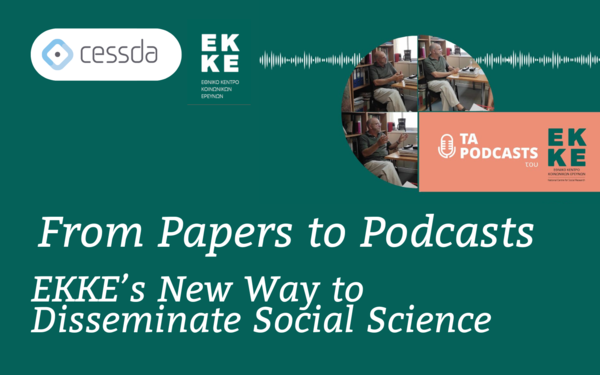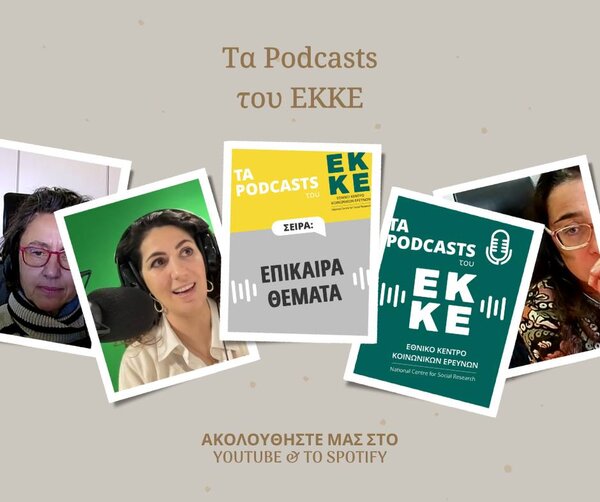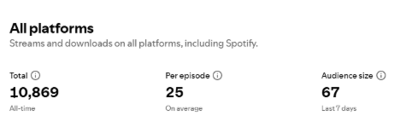
From Papers to Podcasts – EKKE’s New Way to Disseminate Social Science
Since the spring of 2023, the National Centre for Social Research (EKKE) has been producing a series of podcasts through its Communication and Publicity Committee. Aimed at presenting the institution’s research and publications to a broader public, the podcast series has become a cornerstone of EKKE’s communication strategy.
So far, 45 podcast episodes have been published, with an additional 53 created as part of a special tribute to the 50th anniversary of the Hellenic Republic and the restoration of democracy in Greece, launched in spring 2024. The episodes are hosted on Spotify and YouTube, and actively promoted through EKKE’s website, newsletter, and social media channels, including Facebook, Instagram, and LinkedIn.
“This is a very exciting way for us to work with social science research,” says Maria Topali, who works in EKKE’s Communication and Publicity Committee and is deeply involved in the creation of each episode, from selecting topics and inviting guests to hosting the conversations.
“Every time a research project is completed at EKKE, we "bother" the members of the research team by asking them to discuss the key research findings in a podcast. We also try to take advantage of specific anniversaries or official dates. For example, on the occasion of European Demography Day (4 February), we produced a short podcast explaining what this science is currently researching.
You can find the complete collection of episodes at the EKKE Spotify page. While the majority of episodes are in Greek, there are also several in English.
Each episode typically lasts around 30 minutes and features one or two researchers discussing a specific research project or publication. Occasionally, a topic is explored across two episodes to allow for deeper engagement. The format not only brings academic content to life but also serves to broaden its reach beyond academic circles.
“It is important to us that this information is disseminated to society at large, and not only to a narrow circle of experts,” explains Maria.

A promotional poster for the podcast, showing some of the crew behind it.
To this end, the podcast series targets four main audience groups: the scientific community (including researchers, academics, and students); representatives of the media (journalists, bloggers, and influencers); policymakers; and the general public.
“Apart from the first group, the members in the other target groups require scientific discourse to be processed in such a way that it can be understood by non-experts,” says Maria. “Therefore, we put a lot of effort into making sure the language we use in our ESRC podcasts is as simple as possible.” Scientific terms are explained when used, adding an educational layer to the listening experience.
Though technologically modest and produced entirely in-house, the podcasts are resource-intensive in terms of planning and execution. Still, the impact is measurable. Spotify has emerged as the most effective dissemination platform, with steadily increasing numbers of subscribers and listeners. Visibility is also enhanced through strategic tagging and cross-promotion. For instance, podcast guests or affiliated institutions with high social media activity often boost the reach of individual episodes simply by engaging with the content online.
Some episodes go beyond discussing individual projects and delve into the underlying infrastructure that supports EKKE’s research. Several podcasts highlight work stored in EKKE’s digital data repository, accessible via the SoDaNet research infrastructure, which represents Greece in the European CESSDA ERIC network. These episodes include visible hashtags and repository links in their descriptions, enabling listeners to explore the datasets themselves.

The podcast has so far garnered more than 10 000 listens across all platforms, with Spotify being the most used platform to listen in.
One standout example is the recent episode “Lavrio Analyzed,” released on 15 July 2025. It presents a psychosocial survey conducted in the de-industrialized city of Lavrio by researcher Dr. George Bithimitris. The survey, which is based on more than 50 interviews, explores interpersonal relations in Lavrio and is available in EKKE’s data repository in pseudonymised form. The episode discusses not only the research findings but also how the data is stored, accessed, and annotated with commentary and theoretical framing.
As Dr. Bithimitris explains, access to the interview material is conditional on the respondent’s consent and is accompanied by metadata and interpretative analysis. This thoughtful approach highlights the podcast’s dual role as both a dissemination and educational tool: offering transparency, encouraging critical engagement, and supporting future research.
Looking ahead, several new podcast themes are in development. These include a series on the nationwide JustReDI project, which explores resilience and inclusiveness in Greece’s green and digital transition. Plans are also underway for episodes dedicated entirely to SoDaNet and its infrastructure, as well as collaborations with other SoDaNet member institutions to showcase research produced outside of EKKE.
Finally, although not tied to the news cycle, the podcasts are regularly re-promoted when topics become relevant in public discourse. The Communication and Publicity Committee keeps a close eye on current events to ensure that older episodes are resurfaced when timely, reinforcing their long-term value.
EKKE’s podcast project is not only a successful example of digital communication, but also reflects a growing recognition that sharing science effectively requires new formats, open access, and a human voice.